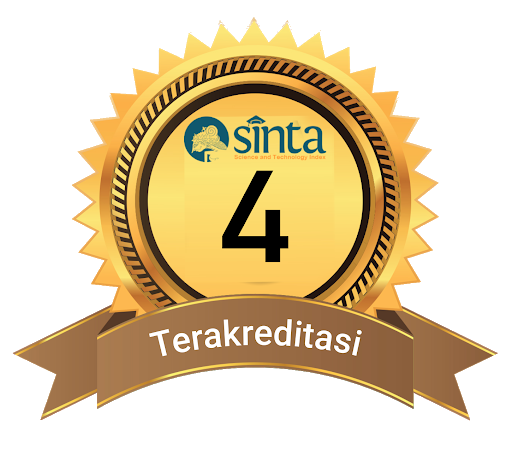PERAN NILAI-NILAI ISLAMI DALAM KEWIRAUSAHAAN UNTUK MENUNJANG SEBUAH KINERJA BISNIS
Abstract
This study aims to examine the influence of Islamic values in entrepreneurship which consists of honesty, working hard, keeping promises, orderly administration, always praying, always paying zakat and alms, and leadership in order to support Muslim business performance. This research is included in quantitative research with a sample of 178 female business respondents who live in Kudus Regency, Central Java, the sampling technique is non-probability sampling. Processing research data using Structural Equation Modeling. The results showed that honesty, working hard, keeping promises, orderly administration, and leadership had an effect on business performance, while always praying, always paying zakat and alms had no effect on business performance. The managerial implication in this study is that business actors need to pay attention to Islamic values, have a leadership spirit being the most dominant factor in improving business performance, so business people need to study leadership theory in running a business.
Keywords
Full Text:
PDF (Bahasa Indonesia)References
Abdullah, Siti Aishah Chu, and Mohd Nizam Sahad. 2016. “Integrated Marketing Communication: A Spiritual and an Ethical Islamic Perspective.” International Journal of Islamic Marketing and Branding 1 (4): 305. https://doi.org/10.1504/ijimb.2016.10002295.
Ahmed, Rizwan Raheem, Dalia Streimikiene, and Xiaosong Zheng. 2021. “The Impact of Proactive Environmental Strategy on Competitive and Sustainable Development of Organizations.” Journal of Competitiveness 13 (4): 5–24. https://doi.org/10.7441/joc.2021.04.01.
Aloulou, Wassim J. 2018. “Examining Entrepreneurial Orientation’s Dimensions – Performance Relationship in Saudi Family Businesses: Contingency Role of Family Involvement in Management.” Journal of Family Business Management 8 (2): 126–45. https://doi.org/10.1108/JFBM-02-2018-0007.
Amirul, Sharifah Rahama, Rasid Mail, Sharifah Milda Amirul, and Jakaria Dasan. 2021. “The Effectiveness of Flexible Working Arrangement: Hybridisation of Human Resource Management and Management Accounting.” Jurnal Pengurusan 62: 101–17. https://doi.org/10.17576/pengurusan-2021-62-09.
Astuti, Rifelly Dewi, Adi Zakaria Afiff, and Tengku Ezni Balqiah. 2017. “Which SMEs Has the Best Marketing Performance?” Proceedings of the European Conference on Innovation and Entrepreneurship, ECIE 2017-Septe (2000): 68–77.
Baranik, Lisa E., Brandon Gorman, and William J. Wales. 2018. “What Makes Muslim Women Entrepreneurs Successful? A Field Study Examining Religiosity and Social Capital in Tunisia.” Sex Roles 78 (3-4): 208–19. https://doi.org/10.1007/s11199-017-0790-7.
Basu, Gautam, and Boise State. 2022. “‘ You Should Pray I Choose the Latter ’: Rioting , Violence , & Amp ; Jouissance,” 1–15.
Bilal, Muhammad, Shafaq Chaudhry, Hina Amber, Muhammad Shahid, Shoaib Aslam, and Khuram Shahzad. 2021. “Entrepreneurial Leadership and Employees’ Proactive Behaviour: Fortifying Self Determination Theory.” Journal of Open Innovation: Technology, Market, and Complexity 7 (3). https://doi.org/10.3390/joitmc7030176.
Bujan, Ivana. 2020. “Entrepreneurial Orientation and Socioemotional Dimensions in Small Family Hotels: Do They Impact Business Performance?” Economic Research-Ekonomska Istrazivanja 33 (1): 1925–42. https://doi.org/10.1080/1331677X.2020.1763824.
Burns, P. 2016. Entrepreneurship and Small Business. Palgrave Macmillan Limited.
Civelek, Mehmet. 2021. “The Mediating Role of SMEs’ Performance in the Relationship between Entrepreneurial Orientation and Access to Finance.” BAR - Brazilian Administration Review 18 (4). https://doi.org/10.1590/1807-7692BAR2021210045.
Committee, Review, Committee Chairperson, Committee Member, Chief Academic Officer, and Sue Subocz. 2021. “Walden University.”
Crovini, Chiara, Gabriele Santoro, and Giovanni Ossola. 2020. “Rethinking Risk Management in Entrepreneurial SMEs: Towards the Integration with the Decision-Making Process.” Management Decision 59 (5): 1085–1113. https://doi.org/10.1108/MD-10-2019-1402.
Delaney, Julian C. 2021. “The Effect of Leadership Styles on Business Performance on Florida SMEs: A Qualitative Case Study.” Dissertation Abstracts International Section A: Humanities and Social Sciences 82 (5-A). https://search.ebscohost.com/login.aspx?direct=true&db=psyh&AN=2020-97489-151&site=ehost-live.
Dey, Tanima Chakraborty, and Shibnath Banerjee. 2021. “Impact of Consortium in Social Media on Businesses of Women Entrepreneurs During Covid 19 Lockdown: A Comparative Study in State of West Bengal.” Parikalpana: KIIT Journal of Management 17 (1): 191. https://doi.org/10.23862/kiit-parikalpana/2021/v17/i1/209029.
Do, Jae Heon, Seung Wan Kang, and Suk Bong Choi. 2021. “The Effect of Perceived Supervisor–subordinate Congruence in Honesty on Emotional Exhaustion: A Polynomial Regression Analysis.” International Journal of Environmental Research and Public Health 18 (17). https://doi.org/10.3390/ijerph18179420.
Duru, Innocent, Paul Ehidiamhen, and Amaka Chijioke. 2018. “Role of Entrepreneurial Orientation in the Performance of Small and Medium Enterprises: Evidence from Federal Capital Territory, Abuja, Nigeria.” Asian Journal of Economics, Business and Accounting 6 (1): 1–21. https://doi.org/10.9734/ajeba/2018/39748.
Fahad et al. 2021. “Entrepreneurial Leadership and Organisational Performance of SMEs in Kuwait: The Intermediate Mechanisms of Innovation Management and Learning Orientation.” Interdisciplinary Journal of Information, Knowledge, and Management.
Falah, Saiful, Abdu Alifah, Syamsul Rizal, and Ummul Quro Al-islami. 2021. “Enhancing Organizational Commitment through Islamic Organizational Culture and Islamic Work Ethic in Modern Pesantren : The Role of Kyai ’ S Transformational Leadership Turkish Journal of Computer and Mathematics Education Research Article.” Turkish Journal of Computer and Mathematics Education 12 (6): 4994–5008.
Ferdinand, Augusty. 2014. Metode Penelitian Manajemen. Semarang: BP Universitas Diponegoro.
Fitri Yunus, Aulia, Sidik Sidik, and Kamaruddin Kamaruddin. 2019. “The Concept of Spiritual Education in Surah Ibrahim Verses 35-41 According to Muhammad Quraish Shihab.” International Journal of Contemporary Islamic Education 1 (1): 20–47. https://doi.org/10.24239/ijcied.vol1.iss1.3.
Garzoni.A, I. De Turi, G. Secundo, and P. Del Vecchio. 2020. Fostering Digital Transformation of SMEs: A Four Levels Approach. Manag. Decis.
Ghozali, I. 2016. Aplikasi Analisis Multivariete Dengan Program IBM SPSS 23 (VIII). Semarang: Badan Penerbit Universitas Diponegoro.
Gomez-perez, Muriel, and Cédric Jourde. n.d. “Women Entrepreneurs in Hajj-Related Travel Agencies Have Successfully Mobilized Various Sorts of Social Capital and Networks to Create , Run , and Expand Their Businesses . Islamic Entrepreneurship in Senegal : Women ’ S Trajectories in Organizing the Haj.” https://doi.org/10.2979/africatoday.67.2.
Haffar, Mohamed, Rasim Ozcan, Magdalena Radulescu, Nicoleta Isac, and Abdelmohsen a. Nassani. 2022. “Hegemony of Network Capabilities, Frugal Innovation and Innovation Strategies: The Innovation Performance Perspective.” Sustainability (Switzerland) 14 (1): 1–13. https://doi.org/10.3390/su14010002.
Hair, et all. 2017. Aprimer on Partial Least Squaares Structural Equation Modeling (PLS-SEM) 2th Edition. Los Angeles, London, New Delhi, Singapore, Washington DC, Melbourne: SAGE.
Harizan, Siti Haslina Md, and Mohd Saifulamri Mustafa. 2020. “Islamic Entrepreneurship: Analysis of Research Trend TT - Keusahawanan Islam: Analisis Trend Penyelidikan.” Islamiyyat 42 (2): 71–84. https://search.proquest.com/scholarly-journals/islamic-entrepreneurship-analysis-research-trend/docview/2472669009/se-2?accountid=45153.
Hartopo, M. 2022. “Rangkul Pelaku UMKM Kudus.” https://jatengprov.go.id/beritadaerah/rangkul-pelaku-umkm-kudus/.
Hewett, R S, J L Rosenbloom, S Chaudhuri, Eau Claire, T E Getzen, and R M Ramazani. 2012. “Social & Behavioral Sciences,” no. September.
Jamai, Kaoutar, Hans De Steur, Ali Abidar, and Xavier Gellynck. 2021. “Impact of Innovation Type on Financial and Non-Financial Performance of SMES. A Scoping Review.” Journal of Innovation Management 9 (3): 27–57. https://doi.org/10.24840/2183-0606_009.003_0003.
Joesyiana, Dkk. 2017. “Strategi Pengembangan Industri Rumah Tangga Di Kota Pekanbaru (Studi Kasus Usaha Tas Rajut Industri Pengolahan Kreatifitas Tali Kur).” Jurnal Valuta 3 (1): 159–72.
Kaya, Metin, and Esra DİNÇ Elmali. 2021. “İŞ KARAKTERİSTİKLERİNİNBi̇reyselİş PerformansÜzeri̇ndekEtki̇si̇ni̇Beli̇rlemeyeYöneli̇k Sağlik ÇalişanlariÜzeri̇ndeBi̇r Araştirma.” Journal of Life Economics, 121–31. https://doi.org/10.15637/jlecon.8.1.12.
Knight, G. 2000. “Entrepreneurship and Marketing Strategy: The SME Under Globalization.” Journal of International Marketing 8 (2).
Levine, Sam, and Contributing Editor. n.d. “Working Capital : Working Hard or Hardly Working ?”
Lumpkin, G. T., and Gregory G. Dess. 1996. “Clarifying the Entrepreneurial Orientation Construct and Linking It to Performance.” Academy of Management Review 21 (1): 135–72. https://doi.org/10.5465/AMR.1996.9602161568.
Machmud, Amir. 2020. “Characteristics of Islamic Entrepreneurship and the Business Success of SMEs in Indonesia.” Journal of Entrepreneurship Education 23 (2).
Masduki, Teten. 2021. “Menteri Teten: Jumlah Kewirausahaan Perlu Ditingkatkan KemenkopUKM.” 2021. https://kemenkopukm.go.id/read/menteri-teten-jumlah-kewirausahaan-perempuan-perlu-ditingkatkan.
Miller, D. 1983. The Correlates of Entrepreneurship in Three Types of Firms. Management Science. Vol. 29.
NadratunNafisah Abdul Wahab, Et.al. 2021. “The Impact of Entrepreneurial Orientation Success Factors to Muslim SMESuccess.” Turkish Journal of Computer and Mathematics Education (TURCOMAT) 12 (3): 2821–32. https://doi.org/10.17762/turcomat.v12i3.1313.
Nekhili, Mehdi, Héla Chakroun, and Tawhid Chtioui. 2018. “Women’s Leadership and Firm Performance: Family Versus Nonfamily Firms.” Journal of Business Ethics 153 (2): 291–316. https://doi.org/10.1007/s10551-016-3340-2.
Noor Hazlina, A., Wilson, C., & Kummerow, L. 2011. “Assessing the Dimensionality of Business Success: The Perspectives of Malaysian SME Owner-Managers.” Journal of Asia-Pacific Business 12 (3).
Pamuncak, Mohammad Bintang, Bayu Taufiq Possumah, and Zairihan Abdul Halim. 2021. “The Impact of Zakat Accounting Standard (Safs Shariah No.109) on the Performance of Zakat Institutions in Indonesia.” Journal of Legal, Ethical and Regulatory Issues 24 (2): 1–14.
Ponta, Linda, Gloria Puliga, and Raffaella Manzini. 2021. “A Measure of Innovation Performance: The Innovation Patent Index.” Management Decision 59 (13): 73–98. https://doi.org/10.1108/MD-05-2020-0545.
Purnama, Chamdan. 2017. “Islamic Culture Impact of Increasing Satisfaction and Performance of Employees: Study of Educational Institutions Sabillilah Sampang.” Asian Economic and Financial Review 7 (5): 528–40. https://doi.org/10.18488/journal.aefr.2017.75.528.540.
RaedHanandeh, D, D Ahmad Hanandeh, and ... 2021. “The Effect of Entrepreneurial Orientation Dimensions on E-Marketing Capability toward Social Media Application: A Case Study on YouTube Live Stream.” Turkish Journal of … 12 (6): 4388–4403. https://turcomat.org/index.php/turkbilmat/article/view/8424.
Rimiyati, H., and M. Munawaroh. 2016. “Pengaruh Penerapan Nilai-Nilai Kewirausahaan Islami Terhadap Keberhasilan Usaha (Studi Pada Pengusaha UMKM Muslim Di Kota Yogyakarta).” Jurnal Manajemen Bisnis 7 (2): 130–57.
Rini, Rini, Ari Purwanti, and Wilda Farah. 2021. “Accountability Index for Zakat.” Journal of Management Information and Decision Sciences 24 (3): 1–10.
Schumpeter, J.A. 2017. Essays: On Entrepreneurs, Innovations, Business Cycles and the Evolution of Capitalism. Routledge.
Sekaran, Uma. n.d. Research Methods For Business (Metode Penelitian Untuk Bisnis). Jakarta. Salemba Empat.
Sugiyono. 2015. Metode Penelitian Kuantitatif, Kualitatif, Dan R&D. Bandung: Alfabeta.
Suryana. 2003. Kewirausahaan. Jakarta: Salemba Empat.
Tong, Zeping, and Shuo Yang. 2021. “The Research of Agricultural SMEs Credit Risk Assessment Based on the Supply Chain Finance.” E3S Web of Conferences 275. https://doi.org/10.1051/e3sconf/202127501061.
Wali, Said, Shams Ur Rehman, and Muhammad Zahid. 2022. “Behavioral Factors and Individual Investor’s Behavior: A Comparative Study of Islamabad and Peshawar Using Partial Least Squares Approach.” Journal of Behavioral Sciences 32 (1): 30–55.
Widiastuti, Tika, Ilmiawan Auwalin, Lina Nugraha Rani, and Muhammad Ubaidillah Al Mustofa. 2021. “A Mediating Effect of Business Growth on Zakat Empowerment Program and Mustahiq’s Welfare.” Cogent Business and Management 8 (1). https://doi.org/10.1080/23311975.2021.1882039.
Zulkifli, R. Mohamad, and M.Mohd Rosli. 2013. “Entrepreneurial Orientation and Business Success of Malay Entrepreneurs: Religiosity as Moderator.” International Journal of Humanities and Social Science 3 (10): 264–75. http://www.ijhssnet.com/journals/Vol_3_No_10_Special_Issue_May_2013/29.pdfnhttp://ijhssnet.com/journals/Vol_3_No_10_Special_Issue_May_2013/29.pdf.
DOI: http://dx.doi.org/10.31958/jeh.v7i1.6515
Refbacks
- There are currently no refbacks.
Copyright (c) 2022 Agus Supriyanto

This work is licensed under a Creative Commons Attribution-NonCommercial 4.0 International License.
El-Hekam Indexed By:














